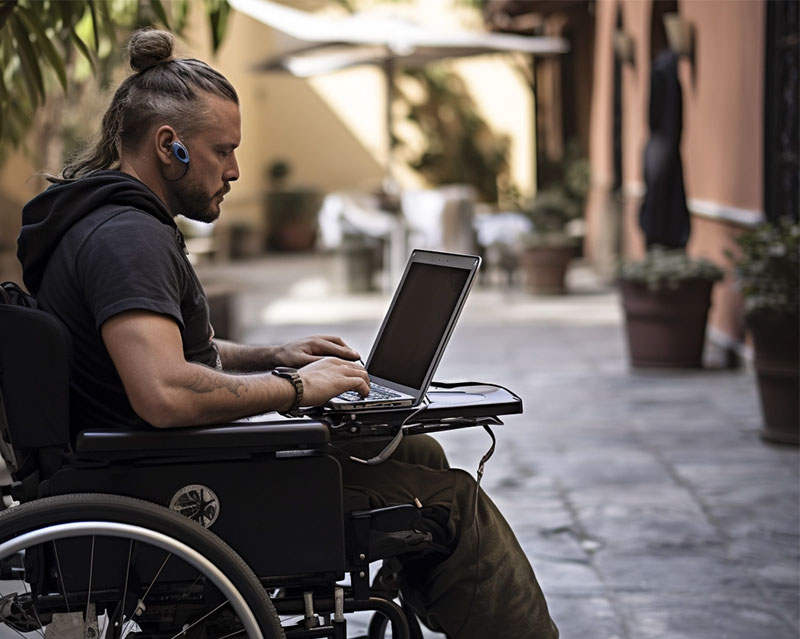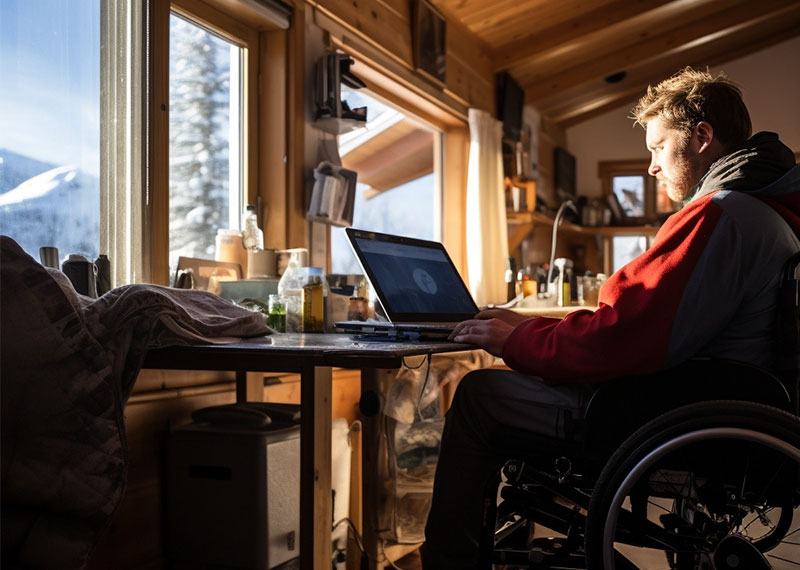Navigating the Digital Nomad Lifestyle with Disabilities
In an era where remote work and digital nomadism have become increasingly popular, it's important to address how all individuals can make this lifestyle work for them, including those with disabilities.
Navigating life and work on the road can be challenging for anyone, but it can be especially daunting for those who are also juggling physical and/or cognitive challenges. That said, with the right tools and strategies, it is possible for someone with disabilities to have a more positive experience as a digital nomad.

It won't be without its challenges, but if you are determined to try out this more flexible working lifestyle, the tips in this article can help you take control of your work-travel experience.
Tips and Technologies to Help Navigate Working on the Road with Disabilities
In many ways, remote, nomadic work can actually allow for more flexibility and customization for those with disabilities. Again, there will certainly be hurdles to overcome, but working on the road could potentially offer you more freedom to customize your work to suit your needs than working in an office might.
There are numerous benefits, in fact, to being a digital nomad with a disability:
- It can offer you a better work-life balance
- Allow you more flexibility with your hours and setup
- Reduce your commute
- Opens your life up to more diverse opportunities
- Can help you discover and connect with other inclusive digital nomad communities
- Enables you to satisfy your desire for more travel and adventure
Of course, there are the challenges to consider as well as the benefits, which we will address below with tips to help you as you get started on your digital nomad journey.
1. Consider Looking Into a Self-Determination Program
Depending on your disability, it may be worth looking into a self-determination program. These programs allow people with disabilities the freedom to live their lives on their terms, such as getting the support needed to live on their own. If you have family that would prefer you live with them or in a group home, for example, a self-determination program could provide you with the resources needed so you can go out on your own and be in charge of your own life while still having access to the support you need.
2. Plan Ahead for the Challenges You Might Face
It's crucial for anyone looking into the nomadic lifestyle to do their due diligence to learn everything they might need to know about working from the road. Even without a disability, working as a digital nomad comes with its unique challenges, but those challenges can be even more difficult to overcome if you do have certain limitations. Thus, it's important that you do your research and plan ahead so you are better prepared for any potential setbacks or things that could make working on the road particularly difficult for you.
First, there is the accessibility of the locations you visit to consider. Not all digital nomad-friendly places are necessarily accessible. You will want to do your research to find places that will have accommodations suited to your needs.
For example, if you plan to stop in a certain city and work from coffee shops or coworking spaces, make sure they are ADA accessible. Two digital tools that can help with planning where you want to go with accessibility in mind include Wheelmap and Access Earth.
Another challenge that digital nomads often face is addressing their health needs while working on the road, and this is even more important if you have a disability.
To ensure your health needs are covered, make sure you create a remote care plan, which includes signing up for a comprehensive insurance plan that will cover you no matter where you are. SafetyWing is a good place to start and is often the go-to insurance for digital nomads.
3. Optimize Your Nomadic Living Space
These days, a big part of the digital nomad life is having a bus or van in which to live and travel that accommodates both personal and work needs. It's important to make sure your "mobile" home has all the accommodations you will need to live and work comfortably.
There are many smart home devices, for example, that can be installed into a van conversion that can make your daily life on the road easier. For example, some people with certain disabilities can be more sensitive to temperature, so installing a smart thermostat can make your nomadic living space more comfortable.
Instead of always having to find the light switches, you can also install smart light bulbs so you can more easily control the lights from your phone. A smart assistant might also be a good option when you are living on the road. Amazon's Alexa or Google Home, for example, are great for hands-free control, which is especially helpful when you have disabilities.
4. Build a Support Network
Isolation is another issue that digital nomads can face if they aren't careful. Luckily, as digital nomadism has grown in popularity, so too have digital support systems.
Overcoming isolation and building a support network is a matter of doing the research ahead of time to find those online communities full of others like yourself who can offer you tips, advice and even just someone to talk to.
You can look for online communities for people with whom you can chat remotely, or there might also be digital nomad meetups and events you can join in person depending on where you are visiting during your travels. You can also look into general online communities and local meetups for people with disabilities; it doesn't have to be specific to the digital nomad lifestyle.
5. Practice Self-Care
Taking care of yourself and your basic needs is crucial for someone with a disability, but this can be more of a challenge when working on the road. Make sure you take the time to really address your needs to ensure you are more capable of thriving in your nomadic life.
Getting good sleep is especially crucial, as it can be easy to develop a sleep disorder such as insomnia when you are living on the road. Poor sleep impact both your physical and mental health, as well as your work productivity.
Take steps to ensure you are getting a good night's sleep, such as obtaining a good bed and practicing activities before sleep that help calm you down, like meditation or listening to soothing music. You can also keep a sleep diary or reach out to a doctor for help if you are concerned about your sleep habits.
Transitioning to the digital nomad lifestyle could has the potential to give the disability community the freedom and flexibility to live a life that is better suited to their unique needs. Again, this isn't to say that digital nomadism is the easier or better choice as it will still come with its own challenges. However, if you plan ahead and know what to expect, you can better prepare yourself and have greater success living as a digital nomad with a disability.
Pre-Register for Abilities Expo Today...It's Free!

